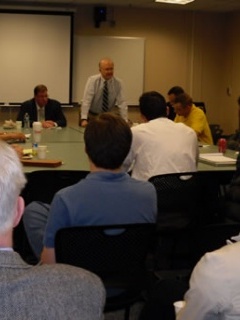FOR IMMEDIATE RELEASE
Contact Information: Hussein Ibish
February 12, 2010 - 1:00am
 ATFP Senior Fellow Hussein Ibish addressed the Wednesday seminar series held by MIT's Security Studies Program on February 10, 2010. His talk focused on evaluating different scenarios for ending the Israeli-Palestinian conflict and the occupation that began in 1967. Ibish told the group of about 30 faculty and graduate students" I think we have to start an evaluation of these suggestions with two fairly obvious points which I think are not disputed by any serious commentator: first, that a military victory which resolves the conflict is not available to either party; and second, that the status quo is untenable and unacceptable to both. Neither Israel nor the Palestinians are going to go away or capitulate and abandon their national identities or projects. Therefore, in the absence of a resolution, or a process leading towards resolution, conflict will continue and there will be a generalized relationship of violence and indeed warfare."
ATFP Senior Fellow Hussein Ibish addressed the Wednesday seminar series held by MIT's Security Studies Program on February 10, 2010. His talk focused on evaluating different scenarios for ending the Israeli-Palestinian conflict and the occupation that began in 1967. Ibish told the group of about 30 faculty and graduate students" I think we have to start an evaluation of these suggestions with two fairly obvious points which I think are not disputed by any serious commentator: first, that a military victory which resolves the conflict is not available to either party; and second, that the status quo is untenable and unacceptable to both. Neither Israel nor the Palestinians are going to go away or capitulate and abandon their national identities or projects. Therefore, in the absence of a resolution, or a process leading towards resolution, conflict will continue and there will be a generalized relationship of violence and indeed warfare."
He continued, "It strikes me that anyone who chooses to argue that a two state peace agreement is either unachievable or undesirable has a political, and indeed a moral, obligation to propose a workable alternative. Everyone must always be asked at every stage: what is your alternative, what is your vision? And let me stress that any alternative scenario must be acceptable to both parties, which is to say it must meet the minimum national requirements of both Israel and the Palestinians, and any other relevant parties. For reasons I've outlined in my book, while I think the one-state agenda might be acceptable to many, and possibly even to most, Palestinians, at least in theory, I am absolutely convinced that there is no way and no one has been able to demonstrate any plausible way to make it appealing to all but a tiny fringe of Jewish Israelis. They will not accept it, and they will fight vigorously and virtually unanimously against it."
Ibish said the same problems apply to the so-called "Jordanian option," that remains a favorite of the Israeli right-wing, noting that " Much the same applies to ideas on the Israeli right about somehow forcing Egypt to resume responsibility for Gaza and passing parts of the West Bank which Israel does not wish to retain back into Jordanian control, thereby obviating the need for any agreement with the Palestinians. This may be very appealing to many Israelis, but it is absolutely unacceptable to the Palestinians, the Egyptians and the Jordanians, and they too will not accept it and will fight vigorously and virtually unanimously against it. So these ideas are not plausible alternatives, because at best they only speak to the interests of one side, are excuses for not having a plausible workable alternative while rejecting the two state solution."
Ibish agreed that many obstacles face the achievement of a two-state agreement, but insisted it was still a possibility and pointed to the new PA state and institution building program as a new means to gain momentum in that direction. He said, " While it is essential for all parties to continue to pursue the top-down diplomatic agenda that will shape the terms of peace, it is just as important for the international community to move quickly to support this bottom-up state and institution building plan that will complement, reinforce and protect the diplomatic track, and ensure that the Palestinian state, when it is established, will be functional and successful. It can also serve as an alternative source of momentum in the direction of peace if diplomacy is at an impasse or yielding too few results too slowly." He urged the greatest possible international aid, technical support and political protection for the program, and described as "the best idea anyone has had in at least 15 years for dealing with this conflict constructively."
TAGS:
















